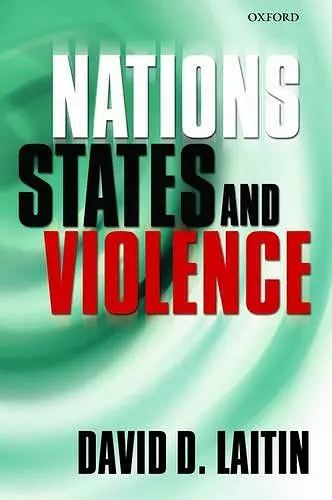Nations, States, and Violence
Format:Hardback
Publisher:Oxford University Press
Published:26th Jul '07
Currently unavailable, and unfortunately no date known when it will be back

Nations, States, and Violence presents a revisionist view of the sources of nationalism, the relationship of the nation to culture, and the implications of nationalism and cultural heterogeneity for the future of the nation-state. It accepts the now-standard view that national identities are not inherited traits but constructed communities in order to serve political ends. But the resulting national identities do not emerge from some metaphorical plebiscite as had been suggested by some; rather they result from efforts by people to coordinate their identities with people who share at least some cultural traits with them. Coordination leads to powerful social and cultural ties that are hard to unravel, and this explains the persistence of national identities. Understood as the result of coordination dynamics, the implications of national homogeneity and heterogeneity are explored. The book shows that national heterogeneity is not, as it is sometimes accused of being, a source of hatred and r s1ence. Nonetheless, there are advantages to homogeneity for the production of public goods and economic growth. Whatever the positive implications of homogeneity, the book shows that in the current world, classic nation-states are defunct. Heterogeneity is proliferating not only due to migration but also because small groups in many states once thought to be homogeneous are coordinating to demand national recognition. With the prohibitive costs of eliminating cultural heterogeneity, citizens and leaders need to learn how best to manage, or even take advantage of, national diversity within their countries. Management of diversity demands that we understand the coordination aspects of national heterogeneity, a perspective that this book provides. In addition to providing a powerful theory of coordination and cultural diversity, the book provides a host of engaging vignettes of Somalia, Spain, Estonia, and Nigeria, where the author has conducted original field research. The result is a book where theory is combined with interpretations of current issues on nationalism, economic growth, and ethnic violence.
The questions raised in the book are the right ones, and so seem to be most of the answers. Laitin's ambitious comparative take is accompanied by depth of analysis, turning the volume into a useful tool for policymakers as well as for the average student. * Daniele Conversi, The Journal of the Review of Politics, Volume 72 *
ISBN: 9780199228232
Dimensions: 211mm x 142mm x 19mm
Weight: 327g
180 pages